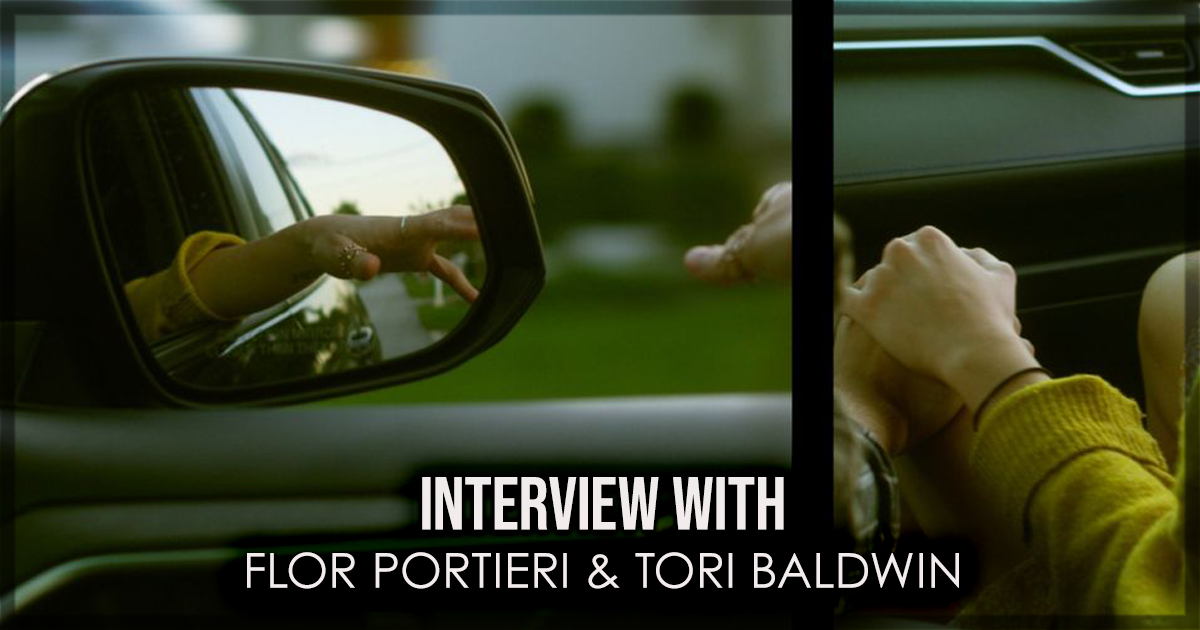Making a movie based on a life-altering event is always difficult. But things become even more chaotic when a filmmaker takes the bold step of creating a project on something that they have endured. And that’s what debutant filmmaker Flor Portieri has done in the short film You Were Never Really Here. From the very first frame, we get an idea that Portieri has come forward to reveal something personal. As the film moves forward, it is quite evident that the director is talking about the harassment she faced during her past relationship.
Young actress Tori Baldwin beautifully portrays the role of Florencia in the movie and takes viewers on a journey that might feel uncomfortable but is so necessary. The film premised at this year’s Slamdance International Film Festival and garnered positive reactions. After watching the movie, I had the privilege of talking about You Were Never Really Here over Zoom with the director Flor Portieri and actress Tori Baldwin. The duo opened up about the challenge of telling this story and how validation is not everything in life.
The Interview with You Were Never Really Here director Flor Portieri and actress Tori Baldwin
[Editor’s note: This interview has been lightly edited for clarity.]
Aayush Sharma: Okay. So first of all, like I said, congratulations on the film, a really hard hitting film about a very sensitive project. But before diving into this project, I would love to know about you guys. So Florencia, while researching about your previous work, I got to know that this is your second short film as a director. The first one came out in 2019. So I’m curious to know about what inspired you to take filmmaking.
Flor Portieri: Yeah, so I consider this first official film. The previous film that came out was a thesis film that I did for school. So that one’s a little bit hidden. I’m surprised that you found it. I grew up in Argentina, like I said in the movie, and as a kid I was always watching movies, especially with my dad. My parents got a divorce when I was really young, and the way that I connected with my dad was through movies, and watching those movies, I wanted to know how those movies had been made and I was inspired and I guess intrigued by the behind the camera magic. I think that’s what inspired me to pursue it. My dad’s always been a photographer as well, so I grew up around cameras and stuff, and then I started school back in Argentina to be a filmmaker, and then I moved to the United States to finish my career there.
On if acting was always Tori Baldwin’s first choice
Aayush Sharma: Amazing. So Victoria, the same can be said for you as well, making your way into the world of acting. I saw your demo reel on YouTube and also the end of semester performance that you did in college. So was acting always your first choice? I mean, when was the first time you thought that this can be your profession?
Tori Baldwin: Right. Sure. Well, thank you for watching those. That’s really cool. Yeah, acting was something, a very similar story. I just grew up… My grandmother was a model back in the ’30s and ’40s, and I think she always had this dream of being in the movies. She loved movies. My mom, she raised her watching all kinds of older movies. So by the time I was around, that was like, “Let’s show her all the classics, get really into it.” And as kids, we all want to be everything at the same time. We want to be an astronaut or a ninja or librarian when we grow up. And then as we get older, we narrow it down to something. And for me, I just could never narrow it down. And I always viewed acting as a way to experience all these things, I guess, through art.
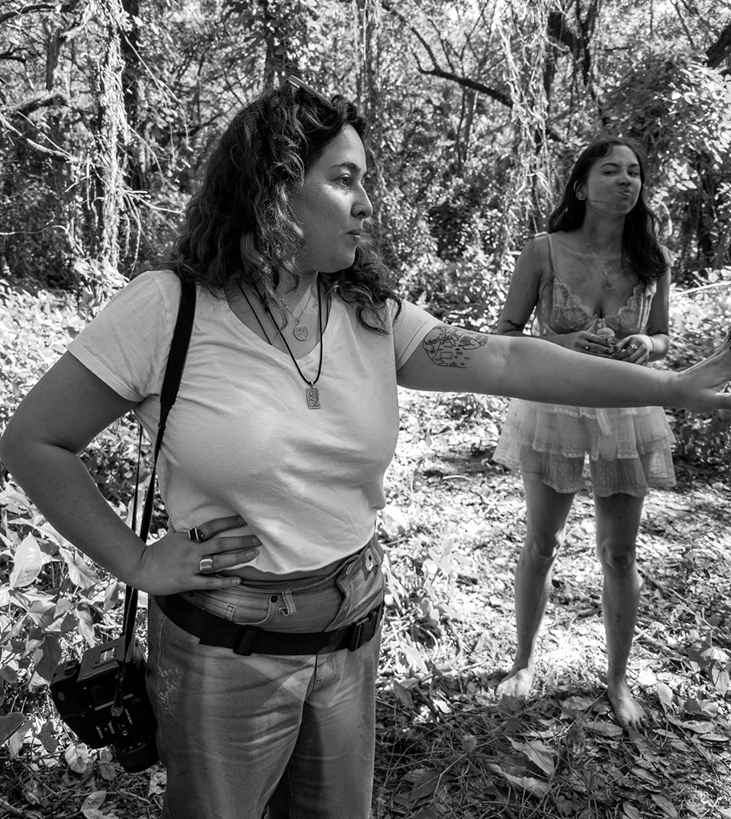
On You Were Never Really Here, validation, and the film’s opening statements
Aayush Sharma: So now coming back to this movie. Florencia, this movie starts with a very strong dialogue about validation. I don’t care about your validation, I don’t need your validation, and the subject that you are tackling, I mean, sometimes people do need validation. I mean, the survivors or the victims, they search for validation after enduring such traumatic events. So what was the thought process behind that particular line, because that line is in itself is a pretty big statement, so can we just go through that?
Flor Portieri: Yeah, yeah, absolutely. So I was struggling with the idea of sharing my story with people that I love, and there was a moment in the last five years or so where I couldn’t deal with it anymore, and I had to open up myself about it, and it was a really hard moment. I talk about it in the movie as well when I talk about the first time I told anyone. And I think part of the fear of sharing these kinds of stories is that most women don’t get validated by people, or I don’t know if validated is the word, but they get second guessed, right? They’re like, “Oh, but did that really happen?”
Flor Portieri: I was in a relationship at the time, and those lines can be blurred at times in the eyes of people outside of oneself. And while making the movie, in the process of developing the movie, I realized that I was making this for myself to heal from this process, and that it didn’t matter to me anymore if people outside of myself and my group of loved ones, believe me or not, because at the end of the day, I know this happened to me. I realized that I don’t need that validation for me to be able to heal from it.
Flor Portieri: I was having a conversation with someone recently that watched the film, and they were like, “I never heard anyone say that before in a film,” and it was powerful because they were like, “I need that validation, but you saying that made me realize that maybe I don’t actually need it.” You know what I mean? So I think it was a little bit of that. It was a process of coming to realization that this was not about anyone else. And through that process, be able to share that story and reach other people that went through similar experiences, be like, “Oh, wait, hold on. Actually, I don’t need validation from the world.” So yeah, I think that’s… That was that.
On finding the courage to tell this story
Aayush Sharma: While watching the movie, I could realize that the film seemed personal. Something was coming out from your heart, you just wanted to tell this story. I could feel it, because just like you, I’ve been also a survivor of harassment, and I know how people just corner you for saying something that you have experienced, because they just don’t believe it, because they… I hope they never face it, but because they haven’t faced it, they just corner you for saying such things. So I wanted to know, it takes a lot of courage to tell a story like this, and when you yourself are making a movie or a short film about your own story, a lot of things happen because a lot of people will tell that I think you should not make it. I think you should not tell your story. How did you overcome that?
Flor Portieri: Yeah, I was fortunate enough to have a lot of support from the people around me. We are both part of a film collective based in Miami called The White Elephant Group, and I was lucky enough to have their support throughout the entire process. I had also gotten support from the Miami Film Festival and from a nonprofit organization called If/Then, that focuses on documentaries. So before I got their support, I had… Years before I had the idea of making this film, I had a reflection that I had done on Twitter. It was a little thread of the ABCs of red flags that I had missed during my relationship.
Flor Portieri: And during that time, that was right when it was the first anniversary of this experience that I had, and it was just a reflection, but I realized that that wasn’t enough for me to feel like I was dealing with my pain and my trauma. And so I decided to explore it a little bit more, and the medium that I know how to do so is film. So I was like, “This could be an interesting experience.” So that’s how it came to be, the idea, and then, like I said, I was lucky enough to have the support of the collective and people outside of the collective, and that gave me some, ironically enough, some validation to push forward and tell the story.
On how Tori Baldwin emotionally prepared to take on the role in You Were Never Really Here
Aayush Sharma: Great. Victoria, as an actor, you are telling a story. You are portraying a character that’s not just only real life, but have gone through a period of trauma over the years, and it takes a lot of sensitivity to play that character. So how do you approach the emotional preparation required to portray a character who is also a survivor of harassment?
Tori Baldwin: Sure. Absolutely. It was an incredibly intimate experience for sure. As a loved one, it was very difficult to learn this in the first place, but once the project started developing, it was very important to tell and to support. So I think there was a little bit of difficulty having this be someone that I loved and cared about very much, but that was part of the challenge to honor what she went through and try my best to just get as deep into it as we needed to for the larger purpose. We had a lot of in-depth conversations, and we just hung out. We had coffee, we just spent a lot of time together and delved into a lot of the nitty-gritty stuff, which I’m very grateful for to have done. And it was definitely a challenge, but I think once we were finally there, everything had culminated and I felt so incredibly comfortable, and I trust her so much that I just rolled with it, and it brought us closer together as friends. We’ve been friends for years at this point, but I think the experience did bring us closer together for sure.
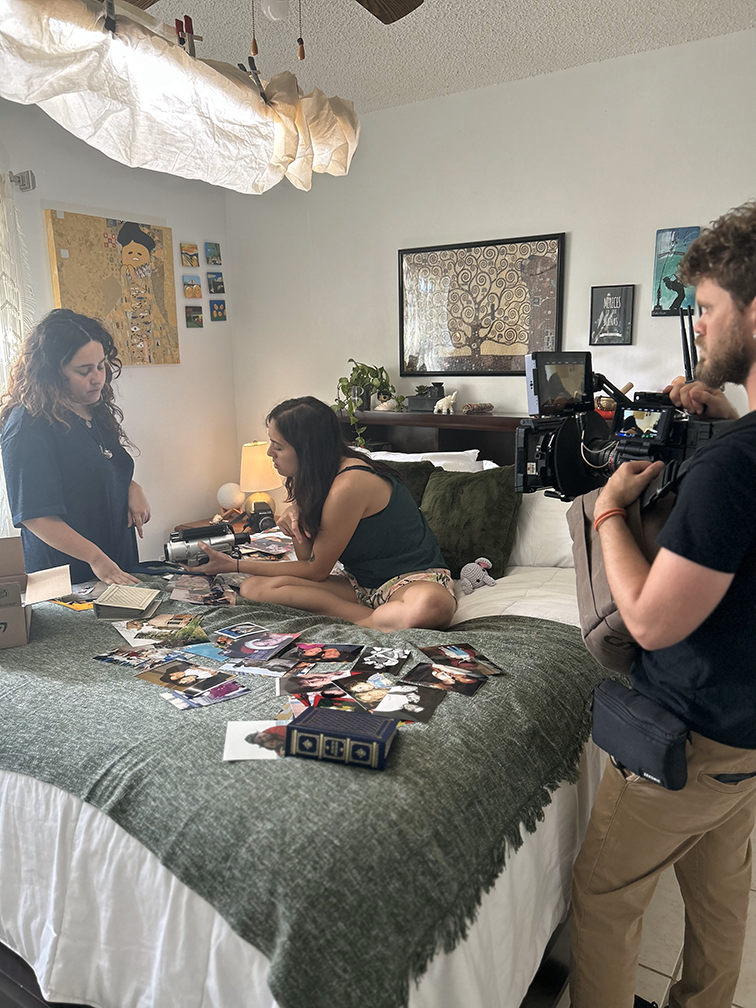
On the challenges of distributing a short film
Aayush Sharma: Amazing, amazing. But Florencia, as a filmmaker, short films are not that easy to sell. We have seen, in the industry, it takes a lot of going back and forth with the production companies, with a lot of companies just saying no, or even not meeting people. What kind of challenges you faced after completing the movie and taking it to the distributors or the producers?
Flor Portieri: Yeah, I mean, like you said, short films are not really commercial products.
Aayush Sharma: Sadly. Sadly.
Flor Portieri: Yeah. Yeah. So yeah, I’m not too sure. I think I’m definitely still exploring the idea of distribution. Now that we are at Slamdance, we’ve been lucky enough to meet a lot of people that are interested in covering the film and even talking about some sort of distribution. My plan moving forward once the festival circuit is over, was to have some impact campaign, and I wanted to reach out to nonprofit organizations that deal with sexual assault survivors and have screenings for them, and have conversations about healing journeys and speaking up and taking ownership of our bodies again.
On if they considered including more survivors in the film
Aayush Sharma: Now, I just wanted to know that if you just got in touch with other survivors as well to include their stories and to include some of the things that they faced in this movie as well.
Flor Portieri: Yeah, I think so. In the process of showing this film, now at Slamdance and stuff, I had some people trust me enough to come talk to me and open up about their own stories. And it’s a very difficult process, because some of these people have been like, “I haven’t shared this experience with anyone else, and I feel seen or that I can trust you enough to share this with you.” So there’s definitely an interest in being able to open up a platform for more people to share their experiences, and I think that might be part of that impact campaign once the festival circuit is over.
Flor Portieri: I struggled, originally, with the idea of bringing more people into the project and tell their stories as well, because I felt like… Sadly, it’s a difficult subject to talk about, and I didn’t think people would be interested in listening to me or other women talk about this experience for 90 minutes. You know what I mean? But there’s definitely an interest in being able to facilitate a space for other people, not only women, but people in general to talk about it and feel comfortable enough to step into themselves again.
On using silence to convey the magnitude of emotions in You Were Never Really Here
Aayush Sharma: Great. So Victoria, as an actor, this role, this nine minutes of film, might turn out to be the one role that takes you to other bigger roles, because we can see your emotions, we can see your skills, and even in the demo real, I must say that you were phenomenal in that demo real. I saw that, and I can say that you have a very bright future. But in this movie, there are certain scenes, there are certain moments where your silence says everything. Just remaining silent in that moment, just captures the idea of what survivors go through and how they are scared. How difficult it was for you to include that element, because from your personality it seems you just need to say things that this has happened and this is very wrong. But how, as a female and as an actor, how difficult it is to just stay silent in those moments?
Tori Baldwin: Sure. It can be difficult for sure. I think that it helps to really focus on the subtext and the meaning behind whatever scene or shot we might have been working on at the time. A good example, one of my favorite parts to work on was the scene where the camera’s very, very close up on the face and the neck and the chest with all the snow raining down and everything. And it’s supposed to visually show what it was like to have a panic attack and be consumed by all of these thoughts. And while there’s things within the movie that I cannot personally identify with, that was definitely one of them. And I think that is the main theme for a lot of it, was that there’s so much happening under the surface for these women who have survived, and you deserve a voice, but you also don’t need to in order to be seen and in order to be validated. So I think that’s where those moments of silence really, maybe hopefully, have that impact.
On contributing to the sexual harassment discourse rather than sensationalizing it
Aayush Sharma: Amazing. So Florencia, as a filmmaker, how do you ensure that your film contributes positively to the discourse surrounding sexual harassment rather than sensationalizing it.
Flor Portieri: Yeah, that’s a fantastic question. I think a big part of it is that I try to stay as sincere as possible, and I think there’s an element of being able to be vulnerable enough and open enough and confident enough in saying it as well, right? In saying, for example, things like, “I’m still working on forgiving him. I think I still hate him.” Because the truth is that most people, if you talk about this, I think it’s in the process of not being sure of how to support you or how to console you. They’re like, “Oh, it’s okay. Just get over it. It’s fine. Don’t think about it. You have to let that go.” And the truth is, is that that’s not how that works. And a part of me still very much hates him, and very much I’m still dealing with the nightmares and certain panic attacks every now and then, though the film has helped me a lot with it.
Flor Portieri: So I think in being able to open up about it and be like, “No, I very much still… I’m still dealing with this. I still hate him, and your validation as whether this happened or not is not something I need,” I think those elements are elements that people can recognize, and I think that’s where that positive impact can show, I think, because it gives a space where you can be like, “You know what? I also, I’m not over this and I’m also much in pain, and I’m also dealing with my feelings towards this person regardless…” One of my biggest goals, in the film is something that we talked a lot about, not only with Tori, but with Jake Melamed, who’s the supporting actor, was that I didn’t want to portray this person as a monster. I understand that he’s human, but that doesn’t mean that I don’t have negative feelings towards this person. So I think those elements are pretty identifiable.
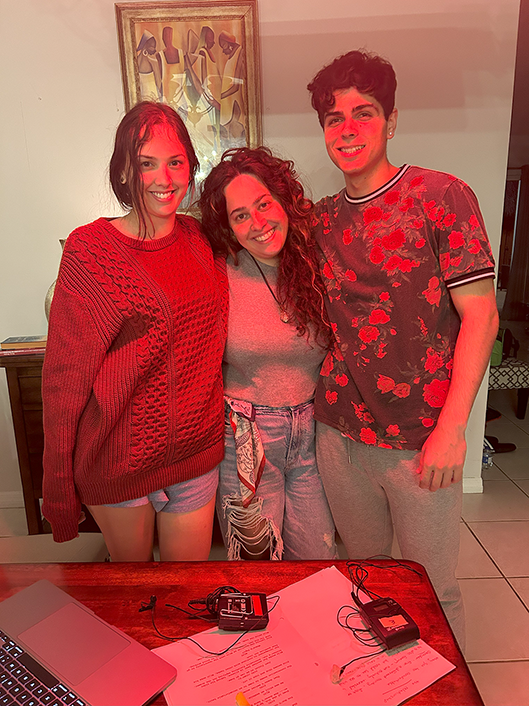
On if Tori Baldwin was always the first choice for You Were Never Really There
Aayush Sharma: Was Victoria always the first choice to play you in the film?
Flor Portieri: That’s a great question. So originally, I wanted to be the subject of the film. I wanted to take a different route, and I had seen a film by a filmmaker from Canada named Sophy Romvari, and her film is called Still Processing. It’s a documentary where she’s very much dealing with, not a similar subject, but something related to her family, and she was the subject of her film. And I thought that was incredibly brave of her and so valuable. And I originally wanted to be the subject of my film, but then as time progressed and I was developing the film and then started working with Hector, who’s the cinematographer, I realized that I wasn’t ready to put myself in front of the camera and put myself through certain scenarios again.
Flor Portieri: And I’m lucky enough to have Tori as a friend, who is not only an amazing friend, but also an amazing artist. And so I went up to her and I was like, “How comfortable would you feel about this?” And once I realized that I wasn’t going to be the subject of the film, she was my first choice. I did not have any other person in mind. So if she had said no, I would’ve been screwed for sure. Because the thing is that she already knew the story. She knew who this other person was, so she had insight into the story, and I felt like it was someone I could trust, but also create a safe space with.
On a lighter note with favorite films
Aayush Sharma: So now just turning this interview in something fun. I would ask you some questions. If you then answer them rapidly, it would be great. So I’ll ask you one by one.
Flor Portieri: Okay.
Aayush Sharma: Florencia, top three movies of all time, your top three movies of all time.
Flor Portieri: Top three movies of all time. Okay, Eight 1/2 by Fellini.
Aayush Sharma: Okay.
Flor Portieri: This is so hard. My guilty pleasure I always say is Shrek 2. So I’m going to put that second place. So one filmmaker choice, one audience choice.
Aayush Sharma: Audience choice.
Flor Portieri: And then third place… I really, really enjoyed recently Talk to Me. I thought it was fantastic. So I’m going to put that one number three, but they shift every year.
Aayush Sharma: Victoria, your top three films of all time.
Tori Baldwin: Let’s see. Interstellar is my all time. Yes. I also want to pick a really silly… I love Bee Movie.
Aayush Sharma: Yes.
Tori Baldwin: And the movie Blade.
Aayush Sharma: Some really interesting choice by Victoria.
Tori Baldwin: Contradicting choices.
Flor Portieri: I think that’s part of the human condition, contradiction, right?
On top actors or actresses they want to work with
Aayush Sharma: So, okay. Florencia top three actors that you want to work with.
Flor Portieri: Oh my God.
Tori Baldwin: Kristen Stewart.
Flor Portieri: So yeah, my top number one is definitely Kristen Stewart. I am obsessed with her. I think she’s fantastic. I’ve been following her since I was a child. Number two, I would say Daniel Kaluuya from Get Out. I am obsessed with him. I think he’s fantastic. And then number three… Complicated. I don’t know. I don’t know. Maybe someone a little older, like Meryl Streep.
Tori Baldwin: Yeah, like Meryl Streep.
Flor Portieri: Yeah, let’s go with it. Yeah.
Aayush Sharma: So Victoria, top three filmmakers that you want to work with?
Tori Baldwin: Greta Gerwig.
Aayush Sharma: Okay.
Tori Baldwin: I’m still not familiar with her name, but she just came out with Saltburn on [Prime Video].
Aayush Sharma: Emerald Fennell.
Tori Baldwin: Yes. Emerald Fennell. And Stephen King.
Aayush Sharma: Oh, nice.
Tori Baldwin: Yeah, I know he’s more of an author, but I love all the films that he’s ever done, so I would love to work with him.
On if they had been anything other than filmmakers
Aayush Sharma: Amazing. Okay. So, Florencia, if you wouldn’t have been a filmmaker, what would you have been?
Flor Portieri: So when I was a kid, not a kid, but when I was younger in high school, a solid choice was psychology. But I always wanted to study philosophy, so I would’ve loved to follow a philosophy career.
Aayush Sharma: Victoria, if you were not an actor, what would you have been?
Tori Baldwin: Same. I have very, very similar thing, but I guess I would probably focus on psychology. I always wonder why we do what we do, in every capacity, all the time, to an existential degree. So I think I would love to go into the research division of psychology and big fan of Carl Jung.
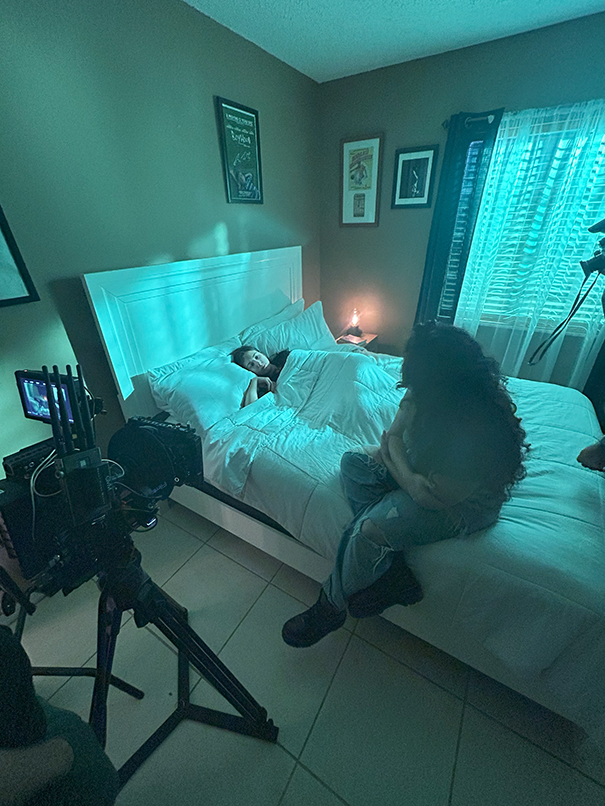
On movies that have stayed with Flor Portieri and Tori Baldwin over the years
Aayush Sharma: Okay, Florencia, three movies that have always stayed with you over the years.
Flor Portieri: What do you mean? Three movies that have always…
Aayush Sharma: Yeah, that have always stayed with you. I mean, it’s like they were so impactful that you couldn’t get them out of your mind.
Flor Portieri: Yeah, I’m going to steal this one from my partner, because he showed it to me. There’s a short film called Yearbook by Bernardo Britto, which is incredible. Incredible short film, it’s an animated short film. And when I first saw it, that changed my perspective, not only of life itself, but also in terms of short films. So maybe that one for sure. Movie that stayed with me… It’s hard, you know when you’re asked a question and you’re like, “Okay, what’s your favorite color?” And you’re like, “I don’t know any colors.”
Aayush Sharma: Any recent movies? Any recent movies that stayed with you?
Flor Portieri: I am really into horror movies lately, so Hereditary has stuck with me. That movie was very impactful, definitely a hard watch. And then… Ooh, so hard. I don’t know. Let me think of the last one.
Aayush Sharma: Okay, Victoria, now your turn.
Tori Baldwin: That’s fair. So actually another short film. There’s one called Boots that was actually written and directed by the kid from Hereditary, plays the brother, Alex Wolff. I think it’s from 2014, 2015. It’s on YouTube. Lovely short film that he had done. Another one that really, really, really stayed with me is called Six Years. The only actress I remember is Taissa Farmiga in it.
Aayush Sharma: Oh, yes.
Tori Baldwin: And I just remember that story really sticking with me. And any Disney movie, man. I totally love Disney movies.
Flor Portieri: I’m going to name my third one. Bit more romantic drama, I would say Her.
Aayush Sharma: Oh yes.
Flor Portieri: Yeah. I love that movie.
On what Slamdance means for them and You Were Never Really Here
Aayush Sharma: Now, I wanted to ask you, you guys are here at the Slamdance. You’re meeting a lot of new people, a lot of aspiring filmmakers. What motivation does festivals like these give aspiring filmmakers and actors like you?
Flor Portieri: Yeah, that’s a great question. So Slamdance has been an incredible experience. We’ve been here for four days now, and everyone at the festival is just beautiful. Just beautiful people, beautiful movies. And Slamdance has the slogan on their flyers that says, “By filmmakers, for filmmakers.” Or sorry, “For filmmakers, by filmmakers,” and that’s something that you can definitely see everywhere around you. Everyone there is a filmmaker, everyone… It is just been great. It’s been great. There’s this thing that my partner also says all the time that I’m also going to steal from him, because he’s a brilliant human being, much more than I am, so I’m going to steal his words. But he always says that beautiful people make beautiful things. And that’s been my experience at Slamdance. Everyone’s been beautiful and the festival’s beautiful. And sharing this space with so many creatives and so many artists has been so surreal. So surreal.
Tori Baldwin: Yeah, I very much agree with that. It’s like walking into the main lobby space or any theater or any lounge, there’s this energy of welcomeness and friendliness, and we all are here because we all love the same thing. And that has been really, really cool. And meeting all these different people as well, it’s so cool to see where everybody’s from, hear what everybody’s doing and working on and hear how similar we might be operating. And we’re all kind of like, “Oh, you’re doing this? Well, I was struggling with this, so maybe we can all help each other out.” And that’s been happening a lot this past week, which is really cool to witness.
Flor Portieri: Yeah, there’s this sense of everyone at Slamdance, it just makes you feel like you’re a part of a family, which is something that we live by with our film collective. We are all friends, we’re a little family and we love each other deeply. And I think that’s very present at Slamdance. And everyone’s been very open to vulnerability and having deep conversations about this hard experiences that we’ve lived and experiences that are part of the human condition, but we’re also open to that vulnerability, which has been great. It’s been beautiful.
Aayush Sharma: Amazing, amazing. So thank you so much guys for talking to me about this movie. Like I said, that is a very hard hitting movie and needs to be watched by everyone, I think. I hope that this movie reaches everyone. Thank you so much, guys. Have a very, very good day. I hope talk to you soon, once again.
You Were Never Really Here played at the Slamdance International Film Festival.
Learn more about You Were Never Really Here at the Slamdance page for the title.
You can see more of Flor Portieri’s work and Tori Baldwin’s work White Elephant Group films.
What did you think about the interview? Did anything surprise you? Share your thoughts with us on X @MoviesWeTexted or leave a comment below.
You might also like…
‘Brando with a Glass Eye’ Interview with director Antonis Tsonis and producer Tia Spanos Tsonis
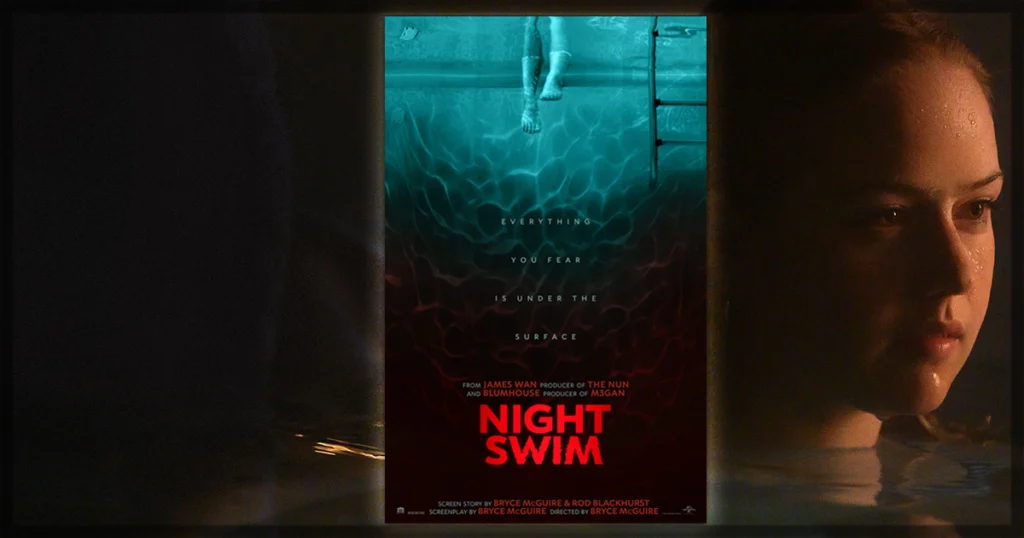
‘Night Swim‘ Can’t Stay Afloat (Review

